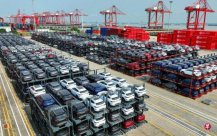Source: Bloomberg
zhao xiaowei resigned from the work of Beijing baristas and returned to the northeast hometown for development. He wouldn't think about it a few years ago.
Beijing's prices are too high. He can only barely spend the day every day. Last June, he decided to return to his hometown of Dandong. He opened a boutique cafe and used a high -end rose coffee bean as dripping coffee.There are more earnings than in Beijing.
ZHAO, 25 this year, said, "I am very close to home now, and I can eat hot rice when I go home. The most important thing is that I have a career."
His experience is just a microcosm of the reverse employment army.In the economic downturn, the company's layoffs have occurred, and the remaining positions are also fiercely competitive.The changes in this employment model are also changing the low -line cities. Western -style fast food restaurants, milk tea chain shops and electric car dealers on the main roads emerge everywhere, satisfying the consumption needs of local residents with higher employment and disposable income.
Although college graduates and professionals still want to find high -paying jobs in big cities, according to data collected by Shanghai Consulting Company's pulse data, the population in Shanghai and Shenzhen in 2023 appeared net outflows.
According to the survey of third -tier cities in January UBS EVINCENCE LAB in January, almost all categories of consumers in small cities in the second half of 2023 are increasing, while large cities are the opposite.Compared with UBS's previous surveys, the consumption of tea and coffee shops in low -level cities has accelerated significantly.
Yumsung China CEO Qu Cuirong said in an interview with Bloomberg TV in February that young people in young people in low -line cities are not so high, so there are budgets for eating and drinking.Excobted.
Yumsu China plans to increase more than 5,000 stores by 2026, more than 50%of which are located outside the major cities.DPC Dash LTD opened 180 Damei Low stores in Mainland China last year, and about 80 % did not be in Beijing and Shanghai.
It is not only the business opportunities that international brands have seen consumers in low -line cities.According to the data of the narrow meals of the Beijing Catering Data Platform, Fuzhou Fuzhou Tastin Catering Management Co., Ltd. and Mixue Bingcheng, including some of the largest fast food and beverage store brands in China, have opened about half of the stores in the third and below cities.Tastin and Ruixing Coffee doubled in China last year.
In fact, people returning to the country have found that the shopping malls on the streets of their hometown are fashionable and unique. Electric cars on the street come and go, and people in the store are crowded.
Housing prices in hometown are far from big cities, and parents can help pay more down payment or more.With the increase of disposable income, consumers will not take it attentively in KFC, and they will not feel distressed when they buy Lululemon's clothes.Some people also bought Tesla cars.
Consumers in small places have more stable civil servants, hospital employees, and state -owned enterprise employees. In large cities, whether they are Internet companies or financial institutions, people are worried about salary reduction or being cut.In the "996 work culture" of first -tier cities, many small places almost do not exist.



